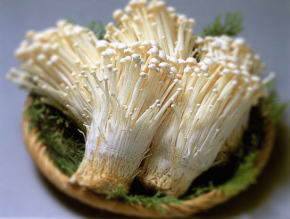 Enokitake (榎茸, エノキタケ, Japanese pronunciation: [enokitake], /ᵻˌnoʊkiˈtɑːkiː/), also Enokidake (榎茸, エノキダケ, Japanese pronunciation: [enokidake], /ᵻˌnoʊkiˈdɑːkiː/) or Enoki (榎, エノキ, Japanese pronunciation: [enoki], /ᵻˈnoʊki/), is a long, thin white mushroom used in East Asian cuisine (such as that of China, Japan, Vietnam and Korea). These mushrooms are cultivars of Flammulina velutipes, also known by the name golden needle mushroom or lily mushroom. Wild forms differing in color, texture, and sliminess are called names including seafood mushrooms, winter mushrooms or winter fungus, velvet foot, velvet stem or velvet shank.
Enokitake (榎茸, エノキタケ, Japanese pronunciation: [enokitake], /ᵻˌnoʊkiˈtɑːkiː/), also Enokidake (榎茸, エノキダケ, Japanese pronunciation: [enokidake], /ᵻˌnoʊkiˈdɑːkiː/) or Enoki (榎, エノキ, Japanese pronunciation: [enoki], /ᵻˈnoʊki/), is a long, thin white mushroom used in East Asian cuisine (such as that of China, Japan, Vietnam and Korea). These mushrooms are cultivars of Flammulina velutipes, also known by the name golden needle mushroom or lily mushroom. Wild forms differing in color, texture, and sliminess are called names including seafood mushrooms, winter mushrooms or winter fungus, velvet foot, velvet stem or velvet shank.
This mushroom is available fresh or canned, with experts recommending fresh enoki specimens with firm, white, shiny caps, rather than those with slimy or brownish stalks that are best avoided.[citation needed] It is traditionally used for soups, but can also be used for salads and other dishes. The mushroom has a crisp texture and can be refrigerated for approximately one week. Enokitake mushrooms contain antioxidants, like ergothioneine. Animal testing has indicated possible applications in the development of vaccines and cancer immunotherapy.
Research at the National University of Singapore, first published in 2005, stated that the stalk of the golden needle mushroom contains a large quantity of a protein, named “Five”/”FIP-fve” by the researchers, that helps in the regulation of the immune system. The mushroom also contains flammutoxin, a cytolytic and cardiotoxic protein that has proven to be non-toxic when absorbed orally.